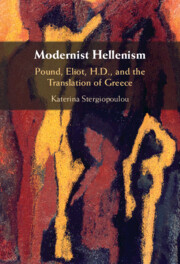4 results

Modernist Hellenism
- Pound, Eliot, H.D., and the Translation of Greece
- Coming soon
-
- Expected online publication date:
- November 2024
- Print publication:
- 31 October 2024
-
- Book
- Export citation
Chapter 6 - Translating the Greeks
-
-
- Book:
- Translation
- Published online:
- 23 September 2022
- Print publication:
- 22 September 2022, pp 82-111
-
- Chapter
- Export citation
ODYSSEAN THEMES - (K.) Riley Imagining Ithaca. Nostos and Nostalgia Since the Great War. Pp. xvi + 331, b/w & colour ills. Oxford: Oxford University Press, 2021. Cased, £30, US$40. ISBN: 978-0-19-885297-1.
-
- Journal:
- The Classical Review / Volume 72 / Issue 2 / October 2022
- Published online by Cambridge University Press:
- 22 June 2022, pp. 411-413
- Print publication:
- October 2022
-
- Article
- Export citation
E. RICHARDSON (ed.) Classics in Extremis: The Edges of Classical Reception. (Bloomsbury Studies in Classical Reception). London and New York: Bloomsbury Academic, 2019. Pp. xi + 256. £85. 9781350017252.
-
- Journal:
- The Journal of Hellenic Studies / Volume 141 / November 2021
- Published online by Cambridge University Press:
- 03 December 2021, pp. 308-310
- Print publication:
- November 2021
-
- Article
- Export citation

